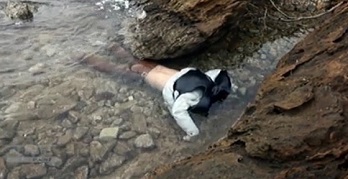German report on horrendous treatment of refugees on Europe’s borders

On Tuesday, the German television news program “Report Mainz” broadcast a [short film][go to the 16:30 mark] dealing with the horrendous treatment of refugees trying to reach Europe.
The report began with the picture of a dead body of a man washed up on the beaches of the Greek island of Lesbos, a holiday destination 6 miles off the coast of Turkey. At the end of the report we learn that the same corpse was transported away by the island’s authorities and dumped in an anonymous grave next to a local rubbish tip.
The nameless individual was one of the many thousands of refugees fleeing war and repression in Afghanistan, Syria and Somalia who travel to Turkey and then try to cross to Greece and the European mainland in flimsy rubber dinghies.
Many of them do not make it. According to figures from Amnesty International cited in the program, up to 100 refugees are washed up dead on the beaches of Lesbos every year. The corpses are cleared away and buried unceremoniously in order to make the beaches free for holidaymakers.
The television program also included video footage showing Greek coastal patrols brutally attacking boats carrying refugees in a manner designed to deter and even sink their vessels. We see video footage of a Greek coastguard vessel approaching a flimsy boat. The guards on the boat train their rifles on the passengers on the boat. We hear a voice roaring at the huddled and terrified refugees: “Don’t make a move, or I will kill you.” A separate video shows coast guards beating and kicking defenseless refugees. A boat owner relates how guards opened fired at his vessel to demobilize it.
One refugee relates how in the melee with guards he jumped overboard and his leg was caught in the propeller of a boat. Severely injured, with his leg broken in several places, he was tossed onto the floor of the coast guard’s boat. Shivering with cold and bleeding heavily, guards refused his request for a blanket.
The handful who do reach the shore of Lesbos alive are held in three tents set up in the local harbor prior to their transportation to special camps. Another section of the film shows the inside of one of the centers where dozens of children and youth are seen behind bars in a communal cell. The children have no idea of the whereabouts of their parents and are awaiting their deportation back to Turkey.
Turkey does not recognize the right to asylum and the fate of the children upon reaching Turkish shores, without their parents, is completely unknown. The film informs us that just 1 percent of refugees arriving in Greece are eventually granted asylum.
The appalling and life-threatening conditions confronting refugees attempting to reach Europe are not new. In its annual report on human rights abuses published at the end of May, Amnesty International (AI) specifically criticized measures taken by Greece to keep out immigrants.
The report condemned the wall recently erected on the Greek-Turkish border that, it warned, “would prevent people seeking international protection from reaching safety and … lead them to attempt unsafe crossings.”
The report also described conditions at a Greek immigrant detention centre in Elliniko as “inhuman and degrading.”
The same AI report then went on to criticize a total of 24 EU states, including France, Germany and Italy, for their own grave abuses committed against refugees and immigrant workers.
The fact is that the deplorable treatment of refugees by Greek coast guards is a direct product of the Fortress Europe policy adopted by the European Union, which denies asylum seekers the right to seek out a destination in Europe. The European Union’s agency Frontex, which is mandated to keep out immigrants at its external borders, has for years provided Greece with both manpower and material support for the detention of those seeking asylum in sub-human and overcrowded centers.
The atrocities committed on the borders of Greece are also an indictment of the completely hypocritical standpoint of the EU regarding the plight of refugees from the war in Syria.
In March this year, six Syrian refugees, including a pregnant woman and three children, were pulled dead out of the water near Lesbos. In the same week the Greek branch of Doctors without Borders criticized the deplorable conditions that await Syrian refugees upon their entry into Greece and the European Union.
Then on Monday of this week the EU responded to US and Israeli pressure by banning the Lebanese-based Hezbollah movement, which has sided in the current fighting with the forces of Syrian President Bashar Assad.
The EU decision gives a boost to the Arab and Western backed terrorist groups seeking to overturn the Assad regime and will only intensify the bloodshed in Syria and magnify the flood of refugees.
Just a week ago the EU home affairs commissioner, Cecilia Malmstrom, addressed a meeting of European justice ministers and applauded the treatment of Syrians fleeing the fighting. “We have from the commission added another €400 million [US$525 million] to the neighboring countries who are doing a fantastic job for 1.8 million Syrians who have left the country,” Malmstrom declared.
Tuesday’s broadcast on German television revealed the grim reality of the “fantastic job” being done for refugees on European borders.
___________________________________________________________________________________
Article published here: WSWS. Photo: © N/A
URL: http://www.a-w-i-p.com/index.php/2013/07/26/german-report-on-horrendous-treatment
























